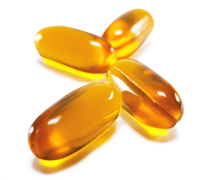Infliximab Helps the Subgroup of Bipolar Depressed Patients Who Faced Adversity in Childhood
At the 2019 meeting of the International Society for Bipolar Disorders, researcher Mike Cosgrove and colleagues described a study of the immune-suppressing drug infliximab in adults with bipolar disorder. The researchers found persistent significant improvements on infliximab only in those with bipolar disorder who also had a history of childhood adversity. Childhood adversity is consistently associated with elevated levels of inflammatory cytokines, and baseline inflammation may be a prerequisite for a positive effect from infliximab, which works by blocking the inflammatory cytokine TNF alpha.
Vitamin D Has More Benefits Than Previously Thought
 Vitamin D has long been known as an important vitamin for bone health, preventing conditions such as osteoporosis and rickets. More recently, research suggests that vitamin D may also protect against conditions such as cancer, heart failure, diabetes, respiratory tract infections, and autoimmune disease.
Vitamin D has long been known as an important vitamin for bone health, preventing conditions such as osteoporosis and rickets. More recently, research suggests that vitamin D may also protect against conditions such as cancer, heart failure, diabetes, respiratory tract infections, and autoimmune disease.
Many Americans have low vitamin D or a vitamin D deficiency. The human body produces vitamin D in large amounts when the skin is exposed to ultraviolet B rays in sunlight. Vitamin D can also be absorbed from vitamin D–fortified foods such as dairy products, some orange juice, and cereals. Some foods such as fatty fish, beef liver, and egg yolks naturally contain some vitamin D, but it is difficult to get enough vitamin D just from consuming these foods.
Low mood or seasonal affective disorder (SAD), in which people feel depressed during winter periods of limited exposure to sunshine, have been linked to low vitamin D.
Other symptoms of low vitamin D vary but can include pain in the joints, bones, or muscles; fatigue; and breathing problems.
Editor’s Note: A few small studies have suggested that 1,500 IU per day of vitamin D supplements can help depressed mood, even in those with normal vitamin D levels. Several studies have indicated that children or adolescents with psychiatric disorders are especially likely to be vitamin D–deficient. Another study found that higher amounts of vitamin D (4,000 IU) could improve cognition in healthy volunteers more than lower doses could. Vitamin D also improved cognition in people with multiple sclerosis and in those with the autoimmune disease Hashimoto’s thyroiditis.
PTSD Increases Risk of Lupus
 A new large 2017 study in the journal Arthritis and Rheumatology reports that post-traumatic stress disorder (PTSD) in women triples their risk of developing the autoimmune disease lupus. The study included 54,763 civilian women whose health data was tracked over a period of 24 years.
A new large 2017 study in the journal Arthritis and Rheumatology reports that post-traumatic stress disorder (PTSD) in women triples their risk of developing the autoimmune disease lupus. The study included 54,763 civilian women whose health data was tracked over a period of 24 years.
Not only did PTSD increase lupus risk, but any traumatic event doubled lupus risk compared to women who were not exposed to trauma.
The researchers, led by Andrea L. Roberts, were taken by surprise at the strong links between trauma and lupus. Trauma was more of a risk factor for lupus than smoking.
Immune Therapy with IVIG May Help Children with PANDAS
 A small number of children exposed to streptococcal bacteria have an autoimmune response that manifests in sudden, severe obsessive-compulsive behaviors and tics. This disorder is known as PANDAS: pediatric autoimmune neuropsychiatric disorder associated with streptococcal infection, and it resembles the broader disorder PANS, which can occur after other types of bacterial or viral infections.
A small number of children exposed to streptococcal bacteria have an autoimmune response that manifests in sudden, severe obsessive-compulsive behaviors and tics. This disorder is known as PANDAS: pediatric autoimmune neuropsychiatric disorder associated with streptococcal infection, and it resembles the broader disorder PANS, which can occur after other types of bacterial or viral infections.
Research on treatments for PANDAS and PANS is scant, but therapies that target the immune system seem to have more success than typical psychiatric treatments. In a 2015 article in the Journal of Child and Adolescent Psychiatry, researcher Miro Kovacevic and colleagues described a case series of 12 youths with PANDAS who were treated with intravenous immunoglobin (IVIG), a treatment designed to regulate the immune system. (The participants also met diagnostic criteria for PANS.)
The authors suggest that PANDAS symptoms result from a misdirected immune response that attacks the patient’s brain instead of or in addition to attacking the initial infection. IVIG treatment uses a mixture of antibodies from about 1,000 people. When this mixture is infused into the patient’s blood, the antibodies help deflect the autoimmune attack on the patient’s body. All of the 12 patients had a good long-term response to IVIG. Some did well after just one infusion, while two needed a second infusion because they did not respond to the first, and five had recurring symptoms that required a second infusion. All of the patients had previously received two other types of treatment: a 5-day course of steroids and antibiotics, neither of which produced immediate improvements.
The authors concluded that effective long-term treatment of PANS or PANDAS should combine immune therapy, prevention of future infections with antibiotics, and treatment that targets their psychiatric symptoms, such as anti-obsessional medication or cognitive-behavioral therapy.
Salt Implicated in Autoimmune Diseases
Autoimmune diseases, in which the body’s immune system begins to attack healthy tissue, have become much more common in recent decades. Some autoimmune problems are related to overproduction of TH17 cells, immune cells that produce a particular inflammatory protein (interleukin-17), but it is not clear why some people’s bodies start producing too many TH17 cells. Three studies published in the journal Nature in 2013 suggest that salt may play a role. They were recently summarized in Scientific American.
In the first study, researchers developed a model of how TH17 cells are controlled. In the second, they observed how immune cells are produced over a period of several days. The researchers noticed that a protein called serum glucocorticoid kinase 1 (SGK1), which is known to regulate salt in cells, seemed to act as a signal for TH17 production. Mouse cells in high-salt environments had more SGK1 and produced more TH17. The third study confirmed the connection with salt using both mouse cells and human cells.
While mice with multiple sclerosis (an autoimmune disease) worsen on a high-salt diet, it is not clear that salt in the diet is related to TH17 production. It is also not clear that slowing TH17 production is the answer to autoimmune diseases since autoimmunity differs across patients and disorders. However, in any event, low-salt diets are recommended for general health concerns, such as blood pressure.
In Veterans, PTSD Is Associated With Autoimmune Illnesses
At a recent scientific meeting, Thomas Neylan and colleagues reported that post-traumatic stress disorder (PTSD) may be connected to autoimmune illnesses. In this study, 673,277 veterans of the US military who had served in Iraq and Afghanistan were screened for the development of PTSD. The illness was diagnosed in 31% of the veterans, and those individuals had a higher incidence of autoimmune-related disorders including thyroiditis, rheumatoid arthritis, inflammatory bowel disease, multiple sclerosis, and systemic lupus erythematosus. Neylan’s research group specifically examined those whose disorders developed after the onset of the PTSD, and found that the statistical relationship between their illnesses and PTSD was strong. However, the researchers also found that there was evidence of a similarly strong relationship in the other direction: veterans who were first diagnosed with some of these same autoimmune difficulties also went on to develop PTSD.
Many previous clinical and preclinical studies have linked altered immune and autoimmune mechanisms to severe stressors such as those that are involved in PTSD. This is the first study to unequivocally demonstrate the relationship in an extraordinarily large number of patients.
Editor’s Note: These findings resemble those that suggest that among the general population, childhood adversity is associated with an increased incidence of a variety of medical disorders in adulthood. Similarly, in the Bipolar Collaborative Network in which this editor (Post) is an investigator, we found that a history of childhood adversity in patients with bipolar disorder was associated with an increased incidence of a variety of medical illnesses in adulthood, including some related to immune and autoimmune function.
More research that would measure inflammatory markers in PTSD and mood disorders is needed. It would also be important to ascertain whether treatment of mood disorders and PTSD reduces the risk of autoimmune disorders.




